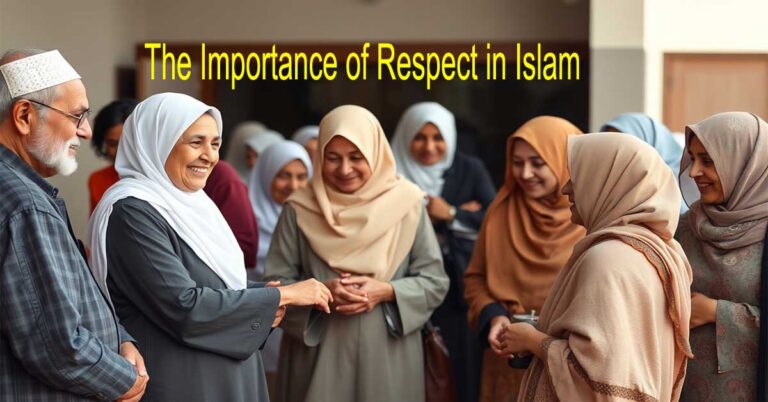Discover the profound importance of respect in Islam and how it strengthens bonds, fosters personal growth, and promotes social harmony. Learn practical ways to embody respect in daily life, rooted in the teachings of the Qur’an and Sunnah, and experience the peace and blessings that come with it.
Introduction: Respect in the Light of Islam
Respect is a core value in Islam, deeply rooted in the teachings of the Qur’an and the Sunnah of Prophet Muhammad (peace be upon him). It fosters love, understanding, and harmony in society, building bridges between individuals and groups. In Islam, respect extends beyond just actions—it reflects in how we think, communicate, and conduct ourselves. This article explores the essence of respect in Islam, its significance, and the profound impact it can have on both individuals and society.
Definition of Respect in Islam
Respect in Islam means recognizing the dignity and rights of others and treating them with kindness and understanding. Islam emphasizes respect for all, whether it’s parents, elders, friends, neighbors, or even those with different beliefs. This respect stems from the acknowledgment that each person is a creation of Allah, deserving of dignity and honor.
Respect for Parents
Islam places a significant emphasis on respecting parents. The Qur’an frequently commands believers to honor and show kindness to their parents. In Surah Al-Isra, Allah says:
“And your Lord has decreed that you not worship except Him, and to parents, good treatment.” (Quran 17:23)
Respecting and obeying one’s parents is seen as a path to attaining Allah’s pleasure and blessings.
Respect for Elders and Scholars
Respecting elders and those with knowledge is a key tenet in Islam. The Prophet Muhammad (peace be upon him) said:
“He is not one of us who does not show respect to our elders, and mercy to our young ones.”
This highlights the importance of respecting the wisdom and experience of elders, as well as the knowledge and guidance provided by scholars.
The Impact of Respect on Society
Respect is a powerful tool for fostering peace and unity. It encourages cooperation, reduces conflict, and enhances social bonds. In an Islamic society, respect creates an atmosphere of trust, safety, and mutual support. People feel valued and are motivated to work together for the common good.
Benefits of Practicing Respect in Islam
Respect brings numerous benefits, both spiritually and socially:
- Attaining Allah’s Pleasure: Respecting others is an act of worship that brings one closer to Allah.
- Promotes Peace and Understanding: Respect reduces misunderstandings and fosters a more inclusive environment.
- Personal Growth: Respectful behavior reflects maturity and contributes to one’s own character development.
- Building Stronger Relationships: Mutual respect strengthens bonds and fosters lifelong connections.
Practical Ways to Cultivate Respect in Daily Life
- Listen Actively: Give your full attention when someone speaks.
- Acknowledge and Value Others: Appreciate others’ contributions and efforts.
- Be Humble: Respect requires humility, as pride can lead to disrespect.
- Avoid Negative Judgment: Always assume the best in others and refrain from criticizing unjustly.
Conclusion: Respect as a Pillar of Islam
Respect in Islam is more than just a virtue; it is a way of life that promotes harmony and understanding. By embracing respect, we create a positive atmosphere for ourselves and others, and we walk a path that is pleasing to Allah. Let’s strive to embody this beautiful value and make it a guiding principle in our lives.
FAQ: Common Questions About Respect in Islam
Why is respect important in Islam?
Respect is fundamental in Islam as it reflects love, kindness, and understanding, which are essential for societal peace and personal development.
Who deserves the most respect in Islam?
In Islam, parents hold a very high place, followed by elders, teachers, and scholars who guide us.
How can one practice respect in daily life?
Practicing respect involves listening, valuing others, showing kindness, and refraining from harsh judgments.
What are the benefits of respecting others?
Respect fosters peace, strengthens bonds, and enhances personal growth.
Is respect for non-Muslims emphasized in Islam?
Yes, Islam teaches us to respect everyone, including those of different faiths, as they too are creations of Allah.
